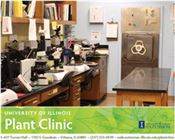|
University Of Illinois Plant Clinic: Celebrating 40 Years Of Service To Illinois

DR. SUZANNE BISSONNETTE AND DIANE PLEWA
URBANA, ILL.
Anniversary Overview of Plant Clinic: Welcome to another year of service at the Plant Clinic! Since 1976, the University of Illinois Extension Plant Clinic has served as a clearinghouse for plant problems. Housed first in the Department of Plant Pathology and now Crop Sciences, the Plant Clinic was originally developed to help County Cooperative Extension staff and campus-based Extension specialists with requests for diagnoses on a wide variety of plants. By acting as a centralized diagnostic laboratory, the Plant Clinic serves as a source of information about plant problems in Illinois. While our primary mission is to provide diagnostic service to Illinois, the Clinic maintains permits to receive plant, pest, and soil samples from the continental US and territories.
For most of its existence, the Plant Clinic was open from May through October. In 2010, we began year round operation. During the off-season diagnostic staff write grants, compile reports, write fact sheets, and present at conferences and meetings around the state to support the outreach mission. Our Nematology diagnostic clinic staff process samples and bioassays year round. The Plant Clinic has taken a lead role in the Illinois First Detector Invasive Species Workshops which started in 2013, as a part of our NIFA CPPM-EIP grant that supports IPM and diagnostics outreach. The workshops are held every year in various locations across Illinois and educate green professionals, city and municipal employees, and concerned public about invasive plants, insects, and diseases that threaten Illinois horticulture and agriculture.
For the past several years, the Plant Clinic has processed over 4,000 plant and soil samples annually. The vast majority of the plant samples are analyzed for disease and insect problems, though plant and insect identification is also performed. The soil samples are analyzed for nematode populations, including Soybean Cyst Nematode and vermiform pathogenic nematodes. Last year a new service testing for herbicide resistance in waterhemp was offered. Protocols for molecular testing for glyphosate and PPO-inhibitor resistance were adapted from ones developed in Dr. Tranel’s laboratory at the University of Illinois, 338 fields (representing 1350 plants) were analyzed. Plants were submitted from Illinois and 4 other Midwestern states.
The Plant Clinic works with the National Plant Diagnostic Network, Illinois Department of Agriculture and the National Sentinel Plant Network to stay aware of new threats in Illinois. Last year we found several new pests in Illinois, including jumping worms (an invasive earthworm) in northern Illinois, and tar spot of corn in north/central Illinois (this disease was found in Illinois and Indiana in 2015 and was a first find in the country). The Plant Clinic also works with the Illinois Department of Agriculture and Illinois Crop Improvement Association to certify diseases present crops for export, and has a partnership with the Illinois Department of Natural Resources to monitor the health of natural areas in Illinois.
The Plant Clinic employs undergraduate and graduate students, providing them with hands-on experience working in a plant diagnostic laboratory and expanding their outreach skills. Staff write articles for various online newsletters, including the Home, Yard, and Garden Pest Newsletter (http://hyg.ipm.illinois.edu/) and The Bulletin (http://bulletin.ipm.illinois.edu/). The Plant Clinic participated in the ACES Family Academies in 2015, where youth ages 6-13 got a chance to use microscopes, inoculate plants, and wash soil to collect nematode eggs. Departmental service includes opening the laboratory for tours and hands-on activities for students, and outreach at events such as Agronomy Day held every August.
Sample Information for the 2016 Season: Plant Clinic services include plant and insect identification, diagnosis of disease, insect, weed, and chemical injury problems (chemical injury on field crops only), nematode assays, herbicide resistance testing of waterhemp to PPO and glypohsate, and help with nutrient related problems, as well as recommendations involving these diagnoses. Microscopic examinations, laboratory culturing, virus assays, qPCR, ELISA and nematode assays are some of the techniques used at the Plant Clinic. Many samples can be diagnosed within a few days. Should culturing be necessary, isolates may not be ready to make a final reading for 10-14 days. Standard nematode processing also requires 1-2 weeks depending on the procedure. Some nematode bio-assays can take up to 4 months. We send your final diagnosis and invoice to you through both the US mail and email.
Please refer to our website at http://web.extension.illinois.edu/plantclinic/ for additional details on samples, sample forms, fees, and services offered. If you have questions about what, where, when, or how to sample call us at 217-333-0519. When submitting a sample, please provide as much information as possible on the pattern of injury in the planting, the pattern on individual affected plants, and details describing how symptoms have changed over time to cause you concern. Pictures of the affected plants or areas can also be sent with the sample to give us a better idea of what is occurring in the environment.
Our fees vary depending on the procedure necessary. General diagnosis including culturing is $15, ELISA and other serological testing is $25, nematode analysis for SCN or PWN is $20, specialty nematode testing (such as corn) is $40. Call ahead for other specialty nematode testing or bio-assays. Checks should be made payable to the University of Illinois Plant Clinic. Please contact us if you are uncertain of which test is needed.
For more information about the Plant Clinic, including how to contact us and submit a sample, please see our website at: http://web.extension .illinois.edu/plantclinic/. We are celebrating 40 years of service to the state of Illinois all season long on our Facebook page (https://www. facebook.com/UofIPlantClinic/) and are looking forward to another 40 years of helping people with their plant problems! ∆
DR. SUZANNE BISSONNETTE: Assistant Dean, Agriculture and Natural Resources, University of Illinois
DIANE PLEWA: Plant Diagnostic Outreach Specialist, University of Illinois
|
|